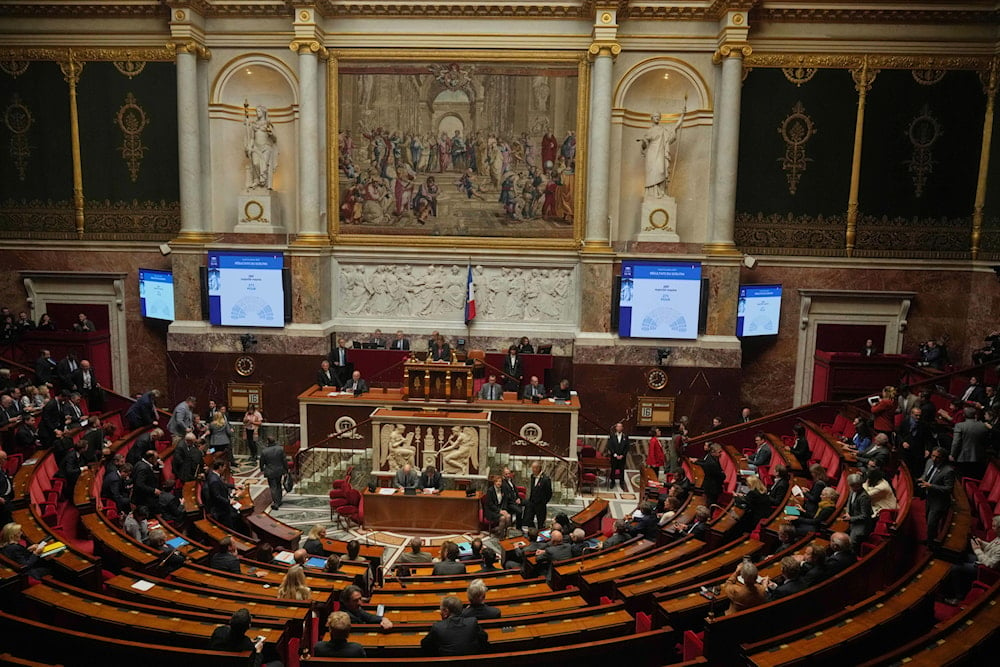France risks Trump backlash as lawmakers move to double big tech tax
France’s parliament votes to double the Digital Services Tax on tech giants like Amazon and Google, risking retaliation from Trump and reigniting transatlantic trade tensions.
-

Scoreboards at the National Assembly show the results of a no-confidence motion vote on French Prime Minister Sébastien Lecornu's government in Paris, France, October 16, 2025. (AP)
France’s National Assembly voted late Tuesday to double the country’s tax on major digital companies, reigniting transatlantic tensions and drawing potential ire from United States President Donald Trump, who has long opposed such levies as unfair to American firms.
The amendment, part of the 2026 budget bill, would raise France’s Digital Services Tax (DST) on the revenues of tech giants like Amazon, Google owner Alphabet, and Facebook parent company Meta from 3% to 6%. The measure, approved in the lower house, still requires further parliamentary votes in the coming months and is not guaranteed to become law.
The proposal is a softer version of an earlier plan to increase the rate to 15%, a move US lawmakers warned would constitute an “unwarranted attack” on US companies and prompt “aggressive retaliatory actions” from Washington.
Macron government treads carefully
Finance Minister Roland Lescure said the government “takes note of Parliament’s desire to strengthen the tax on digital giants,” but cautioned that the issue “must be handled with care,” calling for progress “at the European level and through international discussion.”
President Emmanuel Macron’s centrist administration, which lacks a parliamentary majority, faces mounting pressure to reduce France’s deficit, the largest in the euro area, while appeasing opposition demands for greater taxation on corporations and wealthy individuals. Opposition lawmakers have threatened to trigger no-confidence votes against Prime Minister Sebastien Lecornu if such measures are not adopted.
On Monday, the government revised its budget proposal to raise corporate tax rates, seeking to avert a standoff with lawmakers.
Read more: EU drops digital tax plans in concession to Trump, Big Tech pressure
Digital tax reignites transatlantic tensions
France first introduced its DST in 2019, targeting digital giants that generate substantial revenue from French users without paying corresponding taxes domestically. The move drew immediate criticism from then-President Trump, who accused Paris of discriminating against US firms and threatened retaliatory tariffs on French exports such as cheese, sparkling wine, and luxury handbags.
While a temporary truce was reached under which France agreed to withdraw the DST once global taxation rules were finalized, those international negotiations have since stalled.
Lawmakers who backed the 6% hike argue that the €700 million ($814 million) the DST currently generates each year is disproportionate to the profits Big Tech firms earn from their operations in France. The amendment would also raise the global revenue threshold for companies subject to the tax from €750 million to €2 billion.
Proposal from French left deemed 'inoperable'
In a separate move, lawmakers from the far-left opposition pushed through another amendment calling for a universal tax on multinational firms proportionate to their activity in France. Finance Minister Lescure, however, dismissed the proposal as “inoperable,” citing conflicts with France’s 125 bilateral tax treaties.
As France struggles to balance fiscal constraints with political pressures, the renewed digital tax debate risks reopening a long-dormant trade dispute with Washington, further eroding Franco-American economic relations.
Read more: Dollar slips vs. euro as markets assess trade deals, tax bill

 3 Min Read
3 Min Read










